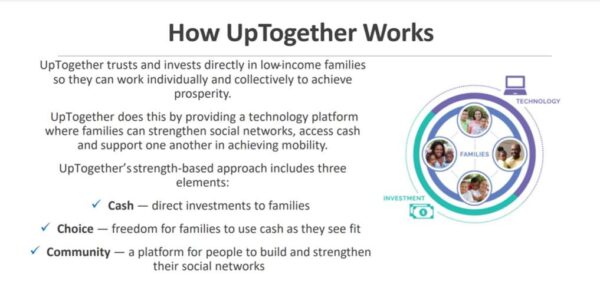
This fall, Fairfax County will launch a guaranteed income pilot program, following in the footsteps of neighbors including Arlington County and Alexandria.
The upcoming Fairfax County Economic Mobility Pilot (FCEMP) will begin providing families with monthly payments totaling $2 million to “promote economic stability and social capital,” according to a press release.
The monthly payments of $750 will go to 180 eligible families chosen via application over the course of 15 months, with the funds being considered untaxable COVID-19 disaster relief that families have the freedom to choose how to spend.
The amount was determined by evaluating the cost of living in the county and the anticipated amount of time necessary to observe and assess the effects of guaranteed income on participants’ lives, a county spokesperson said.
Eligible families will also get access to optional financial coaching from United Way of the National Capital Area‘s Financial Empowerment Center, a partnership with Britepaths and the county, the county spokesperson continued.
“Like other basic income programs, the FCEMP promotes dignity and self-determination by enabling residents to take ownership of their own life and spending decisions,” the county website says.
Eligible applicants must be 18 years or older, have at least one child aged 16 or younger living in their household, and be employed with an income that falls between 150% and 250% of the 2023 Federal Poverty Level. They must also live in one of the following zip codes: 22306, 22309, 20190, 20191, 22041, 20170, 22003, 22150, 20120 or 20151.
The zip codes were chosen by overlaying current Opportunity Neighborhood boundaries and the zip codes they serve with the county’s Vulnerability Index, which analyzes a variety of factors such as race to determine vulnerable areas within the county, a county spokesperson said.
Through the pilot, the county says it hopes the regular payments will result in improved physical and mental health, improved educational outcomes for the children, increased economic stability, higher full-time employment rates, and increased housing and food security.
The pilot specifically aims to help certain households that “earn too much income to be eligible for assistance programs like TANF and SNAP but are struggling to make ends meet or are unable to take financial steps that would allow for economic mobility,” the county says.
As a result, households receiving public assistance benefits, such as Supplemental Security Income or Social Security Disability Income, will not be eligible. However, participants won’t lose their eligibility if they experience any changes in income or public assistance benefits during the pilot.
Supported by a partnership with Beam, a startup that helps administer cash assistance and social safety net programs, the application portal will go live on Sept. 23 and remain open until Oct. 3. Applications will be electronic only, and those selected will be notified via email or text.
The county has also partnered with George Mason University on a study of the pilot. Researchers will collect information from optional personal questions on the application “to understand the impact that unrestricted cash payments have on the economic and social well-being of working households,” the county says.
Participation in the study will not affect an applicant’s likelihood of receiving cash payments.
“Establishing a baseline understanding of families participating in the FCEMP is needed to inform a fully realized program over time,” the county says. “Thus, the FCEMP will measure the economic mobility gains and overall wellness of participants who choose to take part in the research component.”
The FCEMP is authorized by the Board of Supervisors and funded by the county’s general county and American Recovery Plan Act’s Coronavirus State and Local Fiscal Recovery Funds.
Photo via Sharon McCutcheon/Unsplash

A pilot program that will give monthly cash assistance to select low-income residents is in development in Fairfax County.
While eligibility criteria, payment amounts, and other details are still being determined, the county has allocated $1.5 million to the effort from its American Rescue Plan Act (ARPA) funds, as noted in a stimulus update to the Board of Supervisors’ budget policy committee yesterday (Tuesday).
First proposed at a health and human services committee meeting on June 29, the pilot will help people improve their financial situation by providing an additional, flexible source of income, county staff say.
“At its core, it’s an economic mobility initiative, but it’s also an anti-poverty initiative, and it’s certainly innovative,” Deputy County Executive Chris Leonard told the board last summer.
If it implements the pilot, Fairfax County will join a nationwide experiment with basic income programs that has also drawn in Arlington County and Alexandria. Research from around the world suggests the initiatives boost people’s happiness, health, and economic stability without limiting employment.
Fairfax County plans to model its pilot on the nonprofit UpTogether, which gives underserved individuals and families access to cash investments through an online platform that doubles as a social network.
UpTogether’s emphasis on trusting recipients to make their own decisions and building community deviates from traditional social services, which deliver vital resources like food or housing but often come with conditions, such as work requirements.

It’s the difference between helping people survive poverty and giving them the tools to escape it, Board of Supervisors Chairman Jeff McKay explained, suggesting families, particularly those with young children, as a possible target population for the pilot.
“Part of what I think our obligation to do is to stop this generational poverty that seems to happen everywhere in the country,” McKay said. “If you’re going to break the trends of generational poverty, you somehow have to get to the youth.” Read More

